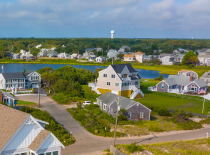All Posts
The Cape Cod Metropolitan Planning Organization (MPO) welcomed Luisa Paiewonsky, Executive Director of the Megaprojects Delivery Office of the Massachusetts Department of Transportation (MassDOT), to its May 19, 2025 meeting for an update on the progress of the Cape Cod Bridges Program.
The Cape Cod Commission invites members of the public to get involved with the ongoing Route 6A Transportation Visioning Study and to share their experiences along the roadway using the online public comment tool or attend an upcoming public meeting.
The Cape Cod Commission has released the draft Cape Cod Vision Zero Action Plan for a 21-day public comment period. The Vision Zero Action Plan is a comprehensive safety action plan to reduce and eliminate serious injury and fatal motor vehicle crashes affecting all roadway users on Cape Cod by 2050. Informed by extensive public outreach, the Plan was developed in close coordination with all 15 towns and the Vision Zero Advisory Committee.
With support from a grant awarded by the Massachusetts Office of Outdoor Recreation (MOOR), within the Executive Office of Energy and Environmental Affairs, the Commission will collaborate with the Cape Cod Chamber of Commerce and the Compact of Cape Cod Conservation Trusts to create a comprehensive database featuring detailed site descriptions and images of recreational areas across Cape Cod. The project aims to improve planning and public access to information about the region's diverse natural resources.
A framework for establishing a Cape Cod Housing Trust and Housing Land Bank is complete. Created in collaboration with consultants Outwith Studio and Utile along with land bank consultants out of Ohio, the framework provides recommendations and next steps for potentially establishing the entity(ies) based on feedback received from stakeholders at numerous meetings throughout the fall and early winter. The framework emphasizes sustainable development and the importance of community engagement in ultimately bringing the entities to life.
A status on projects currently under review by the Cape Cod Commission.
The Massachusetts Division of Ecological Restoration (DER)'s Culvert Replacement Municipal Assistance (CRMA) Grant Program and Training Site Initiative is seeking proposals from municipalities, local government units, and federally recognized and state acknowledged Tribes interested in replacing or removing undersized, perched, and/or degraded culverts or bridges in MA located in areas of high ecological value. The purpose of this funding is to encourage applicants to replace aging culverts with better designed crossings that meet improved structural and environmental design standards and flood resiliency criteria. Applications are due Monday, May 12 at 4pm.
We know thousands of vehicles cross the Bourne and Sagamore bridges each day, but what about the people who don’t drive? To better understand how non-motorists are using the bridges and to plan for future needs, the Cape Cod Commission placed “eco-counters,” portable infrared sensors that detect heat to count pedestrians and bicyclists, near both the Bourne and Sagamore bridges. Data shows that hundreds of pedestrians and bicyclists traverse the canal bridges every year.
The Cape Cod Commission is in the process of updating the 2018 Regional Policy Plan (RPP), which provides regional planning which provides regional planning policies, goals, and objectives to guide development and protect the Cape’s unique natural, built, and community resources. As part of this planning process, the Commission partnered with the Donahue Institute at UMass Amherst to conduct a resident survey designed to better understand public perspectives on local and regional planning challenges. Survey results are now available.
More than $105 million is flowing to wastewater projects across Cape Cod, marking a major investment in protecting the region’s environment and water resources. The Cape Cod and Islands Water Protection Fund (CCIWPF) Management Board voted on April 29, 2025, to award $105,497,500 in subsidies to fourteen projects across ten Cape Cod towns.










